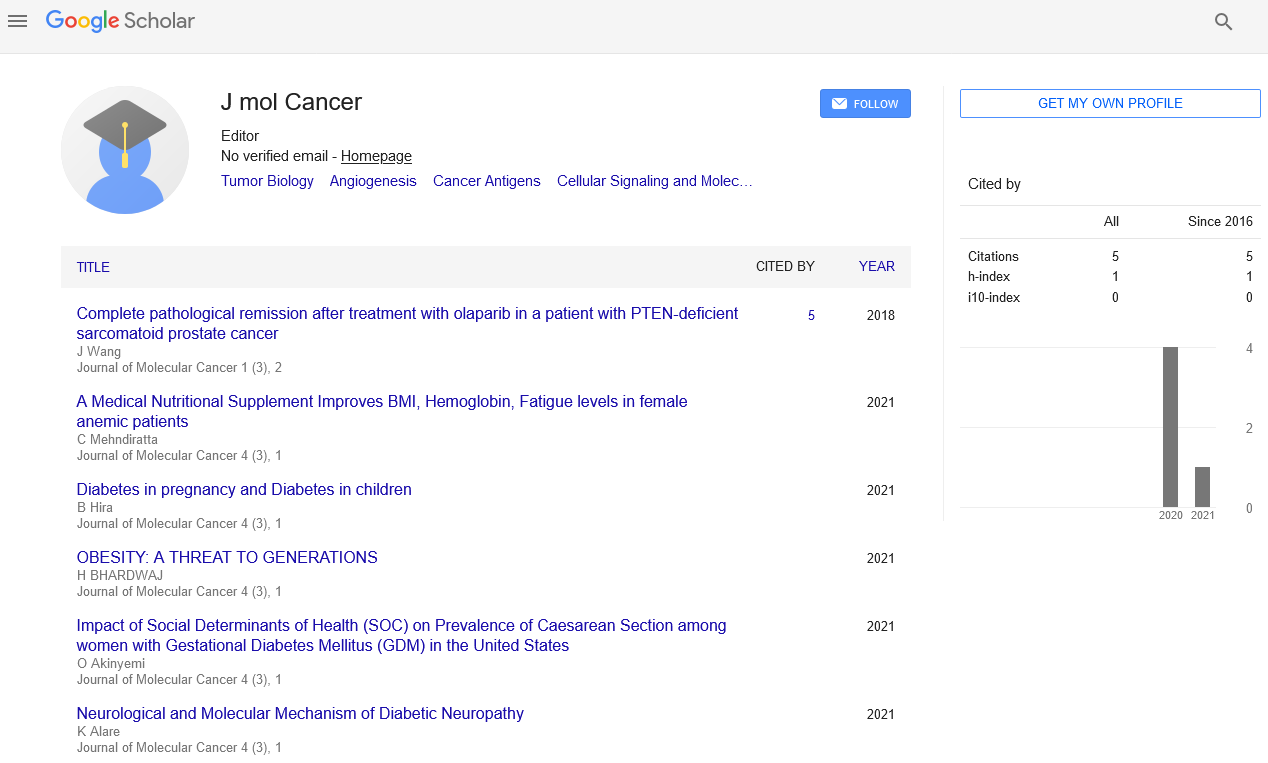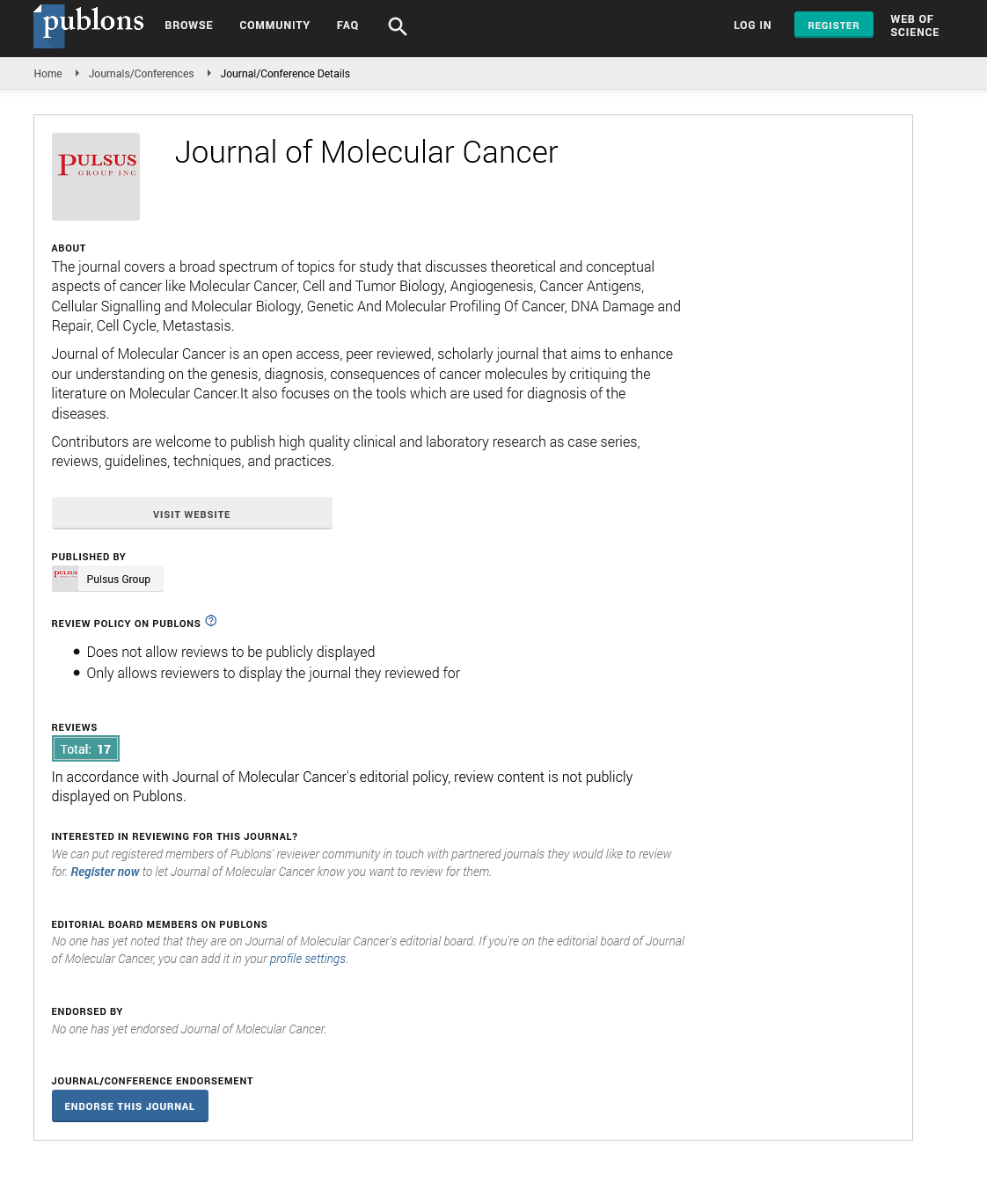Polyspecific antibodies for solid tumors
Received: 21-Nov-2018 Accepted Date: Dec 06, 2018; Published: 20-Dec-2018
Citation: Seetharamu N, Runcie K, Budman D. Polyspecific Antibodies for Solid Tumors. 2018;2(1):1-2.
This open-access article is distributed under the terms of the Creative Commons Attribution Non-Commercial License (CC BY-NC) (http://creativecommons.org/licenses/by-nc/4.0/), which permits reuse, distribution and reproduction of the article, provided that the original work is properly cited and the reuse is restricted to noncommercial purposes. For commercial reuse, contact reprints@pulsus.com
Keywords
Polyspecific antibodies; Bispecific antibodies; Solid tumor oncology; Immunotherapy; Gynecologic oncology
Polyspecific antibodies are genetically engineered proteins that can simultaneously engage two or more different types of epitopes enhancing the specificity and efficacy of monoclonal antibody therapy. Enhanced protein engineering has allowed the foray of these therapies into the treatment of solid tumors which were historically limited by poor target antigens and complex tumor milieu. There are over 100 different formats of polyspecific antibodies [1] and the continued development of novel combination antibodies has created a global next-generation market antibody therapeutics market size estimated to reach $14.1 billion by 2021 [2]. The development of polyspecific antibodies that are directed towards enhancing anti-tumor immunity is particularly enticing in solid tumor oncology. Antibodies targeting checkpoint inhibitors such as Programmed Death receptor 1 (PD-1), PD-ligand 1 (PD-L1) and Cytotoxic Lymphocyte Activated antigen 4 (CTLA4) have been quite successful in providing enduring responses, improving progression-free survival and overall survival [3-5] that they have now become standard of care for treating patients with metastatic cancers of a wide range of histologies. While these new treatments have tremendously transformed cancer care in the recent times, primary and secondary resistance to these agents are frequently noted. As the molecular mechanisms of failure to immunotherapy are being identified, strategies to overcome resistance to these agents are being developed. An important mechanism of resistance involves activation of other inhibitory checkpoint molecules, silencing of co-stimulatory molecules and development of bypass pathways [6]. Clinical trials combining antibodies against various checkpoint molecules are currently enrolling patients [7]. However, all these trials involve concurrent use of multiple agents, sometimes with differing treatment schedules. Polyspecific antibodies can potentially overcome this pitfall. Engaging multiple checkpoint molecules with bispecific biologics offers the potential to improve upon single-agent checkpoint blockade and promises to be the next generation of immunotherapy. Various combination of bispecific antibodies incorporating checkpoint inhibitors-PD-1, PD-L1, Transforming Growth Factor-β (TGF-β), Lymphocyte-activation gene 3 (LAG-3) and T-cell Immunoglobulin and Mucin domain 3 (TIM-3) have continued to proliferate in the pharmaceutical industry and there are now over 1,000 open clinical trials studying these drugs with other immunotherapy strategies as well as in combination with traditional chemotherapy and/or radiotherapy [8]. For example, a phase I trial of RO7121661, an anti- PD-1 and TIM-3 study just opened for adult patients with advanced and metastatic solid tumors [9]. Additional promising strategies to redirect T-cells against tumor cells, engage tumor microenvironment and overcome T-cell exhaustion using polyspecific antibodies are also on the horizon. Tumor- targeted immunomodulators are compounds directed at the malignant tumor antigen as well as the immunomodulatory receptor expressed by tumor infiltrating immune cells [10]. Early clinical results from a phase I trial of the novel bispecific anticarcinoembryonic antigen (anti-CEA), anti-CD3 T cell binding agent showed promise as a monotherapy and was synergistic with atezolizumab (anti-PD-L1) for the treatment of metastatic colorectal cancer [11]. Another phase I clinical trial is exploring ABBV-428, which is a bispecific antibody that targets a tumor antigen as well as CD-40, a member of the Tumor Necrosis Factor (TNF) superfamily and a potent stimulator of antigen presenting cells. ABBV-428 is designed with a silent Fc domain which crosslinks and activates CD40 only in the presence of the target antigen, limiting systemic toxicity [12]. A study is evaluating this agent as monotherapy and in combination with nivolumab in patients with advanced solid tumors [13]. TNF superfamily are multifunctional cytokines involved in many key cellular functions including proliferation, differentiation and cell death. It has various roles in cancer with both pro and anti-cancer properties. Targeting TNF has been difficult for the above reasons as well as off-target effects due to cytokine activation [14]. Tumor-targeted binding of TNF molecules using bi and trispecific agents may be an innovative way to overcome some of these issues. For example: A bispecific compound with trimeric binding to Human (h)4-1BB (a TNF receptor molecule which is upregulated on tumor effector cells, and requires specific crosslinking by tumor antigen for activation.), tumor antigen (fibroblast activating protein, FAP) and engineered heterodimeric Fc portion of cytotoxic T cells allowing for potent co-stimulation of tumor effector cells only in FAP expressing cancer cells was recently described [14]. Pre-clinical studies have shown that co-stimulatory T-cell engagement by PRS-343, a 4-1BB/HER2 bispecific immunomodulator leads to tumor growth inhibition in a humanized mouse model [11]. ALGAPV- 527 is a bispecific antibody in pre-clinical development targeting 4-1BB and 5T4, a protein expressed predominantly on tumor cells including breast, lung, colorectal, and bladder cancers [15]. Tumor necrosis factor superfamily antigens are also being used in combination with checkpoint inhibitors such as Cytotoxic Lymphocyte Activated antigen (CTLA-4) in order to selectively activate the immune system in the tumor area by depleting T regulator cells and enhancing T effector cells [16]. One such combination drug, ATOR-1015, targets CTLA-4 and OX40, and preclinical studies showed successful tumor selectivity and efficacy compared to monotherapy targeting. A phase I study of ATOR-1015 drug is expected to open soon [17]. Another fascinating area of research is with Natural Killer (NK) cells which similarly to T lymphocytes, are being activated and redirected to target malignant cells by the activation of CD16A, an Fcγ receptor expressed on NK cells and macrophages. NK cells, which are large granular lymphocytes have anti-cancer properties and play key role in immune surveillance and cancer control. Many monoclonal antibodies such as rituximab and trastuzumab work through NK cell-mediated Antibody- Dependent Cell-mediated Cytotoxicity (ADCC) [18-20]. Even though harnessing NK cells for cancer immunotherapy is an enticing concept, earlier NK-cell based strategies failed because of lack of specificity and NK cell attrition in-vivo, several new polyspecific constructs have been engineered to tackle these issues. Innovative techniques to harness natural killer cell in immunotherapy have resulted in the production of Bi-specific Killer cell engagers (BiKEs) and tri-specific killer cell engagers (TriKEs). BiKEs are created by the fusion of a Single Chain variable fragment (scFv) against CD 16 (antigen on natural killer cells) and a single-chain Fv against a tumor associated antigen. TriKEs are a combination of a single-chain Fv against CD16 and two tumor associated antigens. Several of these molecules are being engineered and tested in pre-clinical models [18-20]. For example, a BiKE created by fusing a scFv against CD16 with a scFv recognizing EpCAM, was shown to result in a heterodimeric bispecific antibody capable of driving NK-cell-mediated ADCC. Another molecule, AFM24, is a first-in-class tetravalent bispecific NK- cell engager targeting Epidermal Growth Factor Receptor (EGFR) currently in preclinical development [21]. The field of polyspecific cancer immunotherapy has continued to flourish rapidly due to the ability to increase potency by targeting multiple epitopes on a pathogen and simultaneously targeting checkpoint inhibitors or immunomodulators [22]. These agents are poised to take on as the next big class of cancer therapeutics with the promise of target(s)- specific precision and improved safety compared to currently approved therapies for solid tumors. In addition, these agents also do not require the intensive and expensive procedures required for developing CAR-T cells [23]. These agents have already changed treatment landscape for some hematological malignancies and are expected to do the same with solid tumor.
REFERENCES
- Brinkmann U, Kontermann RE. The making of bispecific antibodies. Mabs. 2017;9:182-212.
- Visiongain Ltd. global next-generation antibody therapies market forecast 2017-2027. Retrieved from https://www.prnewswire.com/ news-releases/global-next-generation-antibody-therapies-marketforecast- 2017-2027-629386363.html
- Herbst RS, Baas P, Kim DW, et al. Pembrolizumab versus docetaxol for previously treated, PD-L1-positive, advanced non-small-cell lung cancer (KEYNOTE-010): a randomized controlled trial. Lancet. 2016;387:1540-50.
- Hodi FS, O’Day SJ, McDermott DF, et al. Improved survival with ipilimumab in patients with metastatic melanoma. N Engl J Med. 2010;363:711–23.
- Weber JS, D’Angelo SP, Minor D, et al. Nivolumab versus chemotherapy in patients with advanced melanoma who progressed after anti-CTLA-4 treatment (CheckMate 037): a randomised, controlled, open-label, phase 3 trial. Lancet Oncol. 2015;16:375-84.
- Jenkins RW, Barbie DA, Flaherty KT. Mechanisms of resistance to immune checkpoint inhibitors. Br J Cancer. 2018;118:9-16.
- https://clinicaltrials.gov/
- Kobold S, Pantelyushin S, Rataj F, et al. Rationale for combining bispecific T Cell activating antibodies with checkpoint blockade for cancer therapy. Front Oncol. 2018;8:285.
- Hoffmann-La Roche. A dose escalation and expansion Study of RO7121661, a PD-1/TIM-3 Bispecific Antibody, in Participants With Advanced and/or Metastatic Solid Tumors. https://clinicaltrials.gov/ ct2/show/NCT03708328
- Dahlén E, Veitonmäki N, and Norlén P. Bispecific antibodies in cancer immunotherapy. Ther Adv Vaccines Immunother. 2018;6:3-17.
- Tabernero J, Melero I, Ros W, et al. Phase Ia and Ib studies of the novel cacrinoembyronic antigen (CEA) T- cell bispecific (CEA CD3 TCB) antibody as a single agent and in combination with atezolizumab: Preliminary efficacy and safety in patients with metastatic colorectal cancer (mCRC). J Clin Oncol. 2017;35:3002.
- MedGen UID: 1376851. Anti-CD40/ Anti-TAA Bispecific Monoclonal Antibody ABBV-428. 2018; Concept ID: C4329316. Retrieved from https://www.ncbi.nlm.nih.gov/medgen/1376851
- AbbVie. A Study of ABBV-428, an Immunotherapy, in subjects with advanced solid tumors. https://clinicaltrials.gov/ct2/show/ NCT02955251
- Sethi G, Sung B, Kunnumakkara AB, et al. Targeting TNF for treatment of cancer and autoimmunity. Adv Exp Med Biol. 2009;647:37-51.
- Claus, C, Ferrara, C, Lang, S. A novel tumor-targeted 4-1BB agonist and its combination with T-cell bispecific antibodies: an off-the-shelf cancer immunotherapy alternative to CAR T-cells. In: The American association for cancer research annual meeting, AACR’17. Abstract 3634, Washington, DC, 1–5 April 2017. Philadelphia: AACR.
- Hinner MJ, Bel Aiba RS, Schlosser C, et al. Costimulatory T- cell engagement by PRS-343, a CD137 (4-1BB)/HER2 bipecific, leads to tumor growth inhibition and TIL expansion in a humanized mouse model. European Journal of Cancer. 2016;69:S99.
- Alligator Bioscience. ALG.APV-527 alligator bioscience, lund, Sweden, 2017. Retrieved from https://alligatorbioscience.se/en/research-anddevelopment/ pipeline/alg-apv-527/
- Rezvani K, Rouce RH. The application of natural killer cell immunotherapy for the treatment of cancer. Front. Immunol. 2015;6:578.
- Gleason MK, Verneris MR, Todhunter DA, et al. Bispecific and trispecific killer cell engagers directly activate human NK cells through CD16 signaling and induce cytotoxicity and cytokine production. Mol Cancer Ther. 2012;11:2674–84.
- Tay SS, Carol H, Biro M. TriKEs and BiKEs join CARs on the cancer immunotherapy highway. Hum. Vaccines Immunother. 2016;12:2790– 96.
- Vallera DA, Zhang B, Gleason MK, et al. Heterodimeric bispecific single-chain variable-fragment antibodies against EpCAM and CD16 induce effective antibody-dependent cellular cytotoxicity against human carcinoma cells. Cancer Biother Radiopharm. 2013;28:274-82.
- Alligator Bioscience. ATOR- 1015. alligator bioscience, Lund, Sweden, 2017. Retrieved from https://alligatorbioscience.se/en/research-anddevelopment/ pipeline/ator-1015/
- Kerber A, Kluge M, Reusch U, et al. EGFR/CD16A tetravalent bispecific antibody AFM24 to engage NK-cells to kill EGFR expressing tumor cells and safety results in cynomolgus monkey studies. J Clin Oncol. 2017;35:15:e14001-e.






